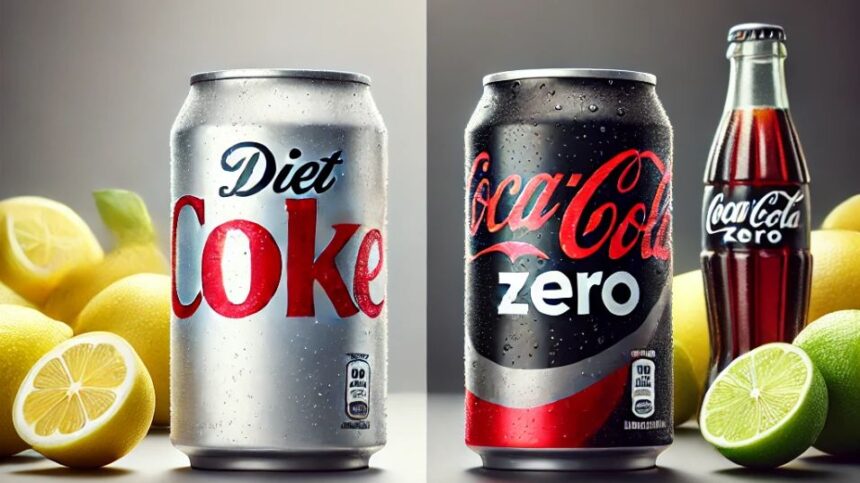When it comes to sugar-free soda options, diet coke vs coke zero are two of the most popular choices offered by Coca-Cola. Both are marketed as healthier alternatives to regular Coca-Cola, with no sugar and minimal calories. However, despite their similarities, Diet Coke and Coke Zero have distinct differences that cater to different tastes and preferences.
Healthier fast food options: 2025 Orders, According to Experts
In this article, we’ll dive into the key differences between Diet Coke and Coke Zero, analyzing their ingredients, flavours, health implications, and more to help you make an informed choice.
The Origins of Diet Coke vs Coke Zero
Diet Coke: Introduced in 1982, Diet Coke was Coca-Cola’s first sugar-free soda. It was targeted at calorie-conscious consumers, offering the iconic cola taste without the calories or sugar.
Coke Zero: Launched in 2005, Coke Zero aimed to provide a taste closer to regular Coca-Cola while being sugar-free. It was later rebranded as Coke Zero Sugar in 2017, emphasizing its zero-calorie and zero-sugar formula.
Key Ingredient Differences
While both beverages are sugar-free, the main difference lies in their formulations.
1. Sweeteners Used
- Diet Coke: Contains aspartame as its primary sweetener. Aspartame is one of the most widely used artificial sweeteners in the world.
- Coke Zero: Uses a combination of aspartame and acesulfame potassium (Ace-K), which provides a sweeter and more robust taste profile closer to regular Coca-Cola.
2. Flavor Formulation
- Diet Coke: Has a lighter and more citrusy taste, making it distinct from traditional cola flavours.
- Coke Zero: Designed to mimic the taste of regular Coca-Cola, offering a richer and more cola-like experience.
Nutritional Comparison
Both Diet Coke vs Coke Zero are marketed as low-calorie or zero-calorie beverages. Let’s look at their nutritional breakdown per 12-ounce (355 ml) serving:
| Component | Diet Coke | Coke Zero |
|---|---|---|
| Calories | 0 | 0 |
| Sugar | 0g | 0g |
| Sodium | 40mg | 40mg |
| Caffeine | 46mg | 34mg |
While the nutritional values are nearly identical, the caffeine content is slightly higher in Diet Coke. This could be a deciding factor for those sensitive to caffeine.
Taste Comparison
The choice between Diet Coke vs Coke Zero often comes down to taste preference.
Diet Coke’s Flavor Profile
- Lighter and more refreshing, with a slight citrusy edge.
- Appeals to those who prefer a less sweet soda experience.
Coke Zero’s Flavor Profile
- Richer and closer to the classic Coca-Cola flavour.
- Preferred by those who enjoy the traditional cola taste without the sugar.
Health Implications
Both Diet Coke vs Coke Zero are marketed as sugar-free options, but their health impact depends on individual consumption habits and overall lifestyle.
1. Artificial Sweeteners and Health
- Aspartame (used in both): Studies show that aspartame is safe for consumption within the daily recommended limits. However, some individuals may experience sensitivity to aspartame, resulting in headaches or digestive issues.
- Acesulfame Potassium (used in Coke Zero): This sweetener is also approved by global regulatory authorities as safe, though some concerns exist about its long-term effects.
2. Weight Management
Both drinks are calorie-free, making them better options for those managing their calorie intake compared to regular soda. However, relying solely on diet sodas for weight loss without making other dietary changes is unlikely to yield significant results.
3. Dental Health
While sugar-free, Diet Coke and Coke Zero are acidic, which can erode tooth enamel over time. It’s advisable to drink them in moderation and rinse with water afterwards to protect your teeth.
4. Caffeine Content
Diet Coke’s slightly higher caffeine content might be beneficial for those looking for a quick energy boost. However, excessive caffeine consumption can lead to jitters, insomnia, and increased heart rate.
Popularity and Target Audience
Diet Coke:
- Often associated with health-conscious consumers, especially older demographics who have been loyal to the brand since its launch.
- Its unique citrusy taste has created a niche following among soda enthusiasts.
Coke Zero:
- Marketed more toward younger consumers and those seeking a taste closer to regular Coca-Cola.
- It is rebranding to Coke Zero Sugar further emphasized its focus on flavour similarity to classic Coke.
Which One Is Better?
The answer depends on personal preferences and priorities:
- Diet Coke may be the better choice if you prefer a lighter, more refreshing drink with a unique twist.
- If you want a sugar-free option that closely mimics the taste of regular Coca-Cola, Coke Zero is likely your go-to.
Are There Alternatives to Consider?
For those who want to explore beyond Diet Coke and Coke Zero, Coca-Cola offers other sugar-free options:
- Coca-Cola Life: Sweetened with natural stevia for those looking for a plant-based sweetener alternative.
- Sprite Zero: A sugar-free option for those who prefer lemon-lime sodas.
- Pepsi Zero Sugar: Pepsi’s version of Coke Zero, offers a similarly bold cola flavour.
Tips for Healthier Soda Consumption
While sugar-free sodas like Diet Coke and Coke Zero can be part of a balanced diet, moderation is key.
- Limit Intake: Avoid excessive consumption to reduce potential risks associated with artificial sweeteners and acidity.
- Stay Hydrated: Pair soda consumption with plenty of water throughout the day.
- Watch for Cravings: Some studies suggest that artificial sweeteners may increase cravings for sugary foods. Balance your diet with whole, nutrient-rich foods.
Conclusion
When it comes to the Diet Coke vs Coke Zero debate, the choice ultimately boils down to personal taste and preferences. Both offer a calorie-free, sugar-free alternative to regular soda, catering to different flavour profiles and target audiences.
Whether you’re a fan of Diet Coke’s crisp and citrusy notes or Coke Zero’s rich and classic cola taste, both options can be enjoyed as part of a balanced lifestyle. Just remember to consume them in moderation and prioritize overall health and wellness.

